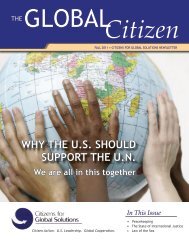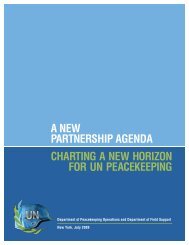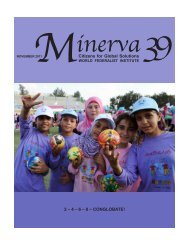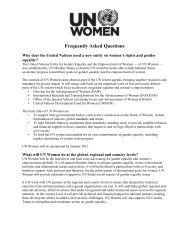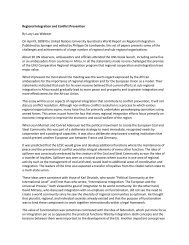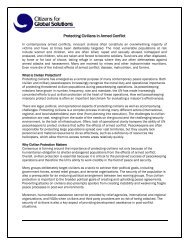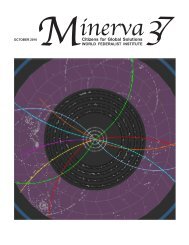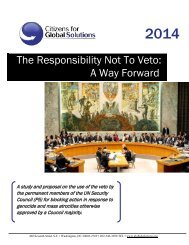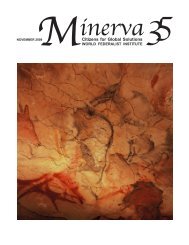Minerva, Spring 2008 (Volume 32) - Citizens for Global Solutions
Minerva, Spring 2008 (Volume 32) - Citizens for Global Solutions
Minerva, Spring 2008 (Volume 32) - Citizens for Global Solutions
You also want an ePaper? Increase the reach of your titles
YUMPU automatically turns print PDFs into web optimized ePapers that Google loves.
But to go to the heart of Didier Jacobs’ argument, I would agree that his recommendations<br />
are plausible and that, if they were to play out in the way that he advocates, the<br />
world would be a great deal better off than it is today. But “plausible” does not translate<br />
into “probable” or “most desirable”.<br />
Basically, what he seems to be arguing — although never stated explicitly — is <strong>for</strong><br />
by-passing the fundamentally flawed and insufficiently democratic UN system and<br />
strengthening and/or creating “second-tier” institutions, most notably NATO (renamed)<br />
and the WTO, under the leadership of mainly Western democracies, to per<strong>for</strong>m tasks<br />
that the UN is insufficiently capable of doing well. I believe that approach would tend<br />
to polarize the world, with a group of nations, led mainly by China, in one camp and<br />
another group, led mainly by the US, in the other. My sense is that the US has, in the<br />
last couple of decades (and especially in the G.W. Bush years), so badly compromised<br />
its own moral authority, brain-washed its own citizenry, and promoted a wildly inaccurate<br />
view of the rest of the world, that we have <strong>for</strong>feited whatever claim to leadership<br />
we once enjoyed. I think it will take decades to repair the damage. Moreover, I would<br />
<strong>for</strong>esee the process of building up communities of “democratic” membership in the<br />
second-tier institutions as being subject to perennial political pressures and the acceptance<br />
of double standards such that our friends will time and again be given the benefit<br />
of the doubt and be seen as democratic, whereas nations whose <strong>for</strong>eign and economic<br />
policies we don’t happen to like will be branded as despotic.<br />
My own preference would be to re<strong>for</strong>m and strengthen the existing organs, to create<br />
needed new organs under the UN umbrella, and to make all such organs, with the sole<br />
exception of the UN Human Rights Council, maximally inclusive. I would be prepared<br />
to give a voice to those with whom I now strongly disagree in the expectation that doing<br />
so is likely, over time, to lessen the gulf between their views and my own. The best<br />
way to move undemocratic nations in the direction of greater democracy, in my opinion,<br />
is to maintain polities, social systems and economies that much of the populations<br />
in the world’s less democratic societies will wish to emulate, just as they now emulate<br />
so much of Western culture. The process is not likely, in my view, to play itself out any<br />
more slowly than the one that Mr Jacobs recommends. Regrettably, neither he nor I<br />
has a crystal ball to ascertain whether future change will be more along the path that he<br />
recommends than along the one that I favor.<br />
<strong>Global</strong> democracy is, Didier Jacobs argues,<br />
an idea whose time has come – and<br />
he is surely right about that. Drawing on<br />
his extensive experience in economics,<br />
international affairs, and as a citizen of<br />
the European Union, Jacobs presents<br />
a concise, clear, and realistic case <strong>for</strong><br />
moving <strong>for</strong>ward on what is likely to be<br />
the great civil rights struggle of the 21st<br />
century. This is a book that everyone interested<br />
in creating a better world should<br />
read, discuss, and act upon.<br />
- Peter Singer,<br />
Princeton University.<br />
<strong>Global</strong> Democracy tackles one of the<br />
most important questions of our time:<br />
how to bring global governance under<br />
a modicum of democratic control. In<br />
the age of “governance without government”,<br />
Didier Jacobs reminds us that<br />
institutions matter, and that the concept<br />
of political equality is as relevant at the<br />
global level as it is at the national level.<br />
- David Held,<br />
London School of Economics<br />
IV - RESPONSE (Didier Jacobs)<br />
The world is changing, and I propose new definitions <strong>for</strong> familiar words to reflect that<br />
change. The boundaries between states and international institutions are increasingly<br />
blurred. Most analysts agree that international institutions engage in “global public<br />
policy”, and refer to them with increasingly convoluted terms such as “system of global<br />
governance”. Why not simply call them what they are: “our global government”? I<br />
believe in the power of ideas, and the power of words. If most activists referred to the<br />
UN, World Bank, WTO etc. as “our global government”, the media would soon take<br />
on that phrase, and people would question why they do not elect representatives to that<br />
government.<br />
“<strong>Global</strong> governance” is little more than a euphemism hiding the lack of democracy at<br />
the global level of government. Likewise <strong>for</strong> “federalism”. Joe Schwartzberg may be<br />
nostalgic of a neat definition of federalism that was useful in the past. But what is the<br />
essence of a federation and of a confederation? The essence of the difference is that the<br />
federated entities can escape the rules of a confederation (either by vetoing them or by<br />
opting out of them) but can be <strong>for</strong>ced to abide by them in a federation (no veto or optout<br />
right). By that simple definition, the WTO has de facto achieved world federalism<br />
by stealth. World federalism is no longer a utopia, it is reality! And the task is now to<br />
democratize our federal world government.<br />
The future that I advocate is one where<br />
the United Nations continues to play the<br />
roles it plays today, as well as it can, but<br />
where nations that are willing to cooperate<br />
more closely to build a better world do<br />
so in various international <strong>for</strong>ums. Two<br />
principles should guide those “secondtier”<br />
institutions: inclusiveness and sharing<br />
power. Inclusiveness means that all<br />
nations willing to respect more demanding<br />
rules of cooperation should be welcome<br />
to join: nations would stay out only<br />
because they are not willing to abide by<br />
the rules, not because they are not invited<br />
in the first place. Sharing power ultimately<br />
means applying majority voting with<br />
the “one person, one vote” rule, although<br />
there can be many intermediate steps to<br />
get there. So, contrary to Joe Schwartzberg’s<br />
understanding, this is not the old<br />
model of US-led alliance.<br />
52 • <strong>Minerva</strong> #<strong>32</strong> • June <strong>2008</strong>



